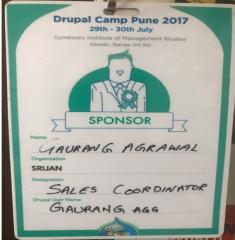What differentiates the winner ( stock )?
Submitted by GAURANGAGG on Sat, 05/20/2017 - 12:12
What differentiates the winner ( stock )?
Great, scalable, highly profitable business run by a great team of managers.
“Roller coaster journey of stocks are barely visible if you look at the 45-10-15 years chart as every massive decline represent a minuscule part of the chart.
For investors who bought those kind of stocks like Wabco 5 years ago and have held it till now, those major declines didn’t matter. And for people who understands the long term wealth creation, such sudden declines are a wonderful opportunity to average up - which is contrary to the wisdom of many.
identifying the great businesses where the valuation is not crazy expensive relative to its long term potential earning power, then don’t sell after massive sudden drop ( let’s say 50% or more). Buy more of it that time.
In the book “Common Stocks and Uncommon Profits”, he wrote:
If the investment is in a well run company with sufficient financial strength, even the greatest bear market will not erase the value of holding. Unusual stocks have subsequent peaks many times the previous peaks. Therefore risk and reward considerations favour long term investment - holding.
Identifying and staying with the right stocks through even a major temporary market drop, you are at most going to be temporarily behind 40 percent of the former peak at the very worst point and will ultimately be ahead but if you would have sold the right stocks to prevent short term temporary losses, and you don’t buy them back you will eventually lose long term profits.
Either you will sell too soon and you would have postponed reinvestment too long to recapture the profits possible ( a situation which prevents you from holding multi-baggers ).
“There is more to learn from the Texas Instruments and Central California Electronics situations. When I originally acquired these Texas Instruments shares in the summer of 1955, they were bought for the longest type of long-range investment. It seemed to me that the company fully warranted this degree of confidence. About a year later, the stock had doubled. With one exception, the various owners of the funds I managed, familiar as they were with my method of operations, showed no more interest in taking a profit than did I. However, at that time I had one relatively new account owned by people who, in their own business, were used to building tip inventory when markets were low and cutting it back sharply when they were high. Now that Texas Instruments had doubled, they brought strong pressure to sell, which for a time I was able to resist. When the stock rose an additional 25 percent to give them a profit of 125 percent of their cost, the pressure to sell became even stronger. They explained, "We agree with you. We like the company, but we can always buy it back at a better price on a decline." I finally compromised with them by persuading them to keep part of their holding and sell the rest. Yet when the big drop occurred several years later and the shares fell 80 percent from their peak, this new bottom was still almost 40 percent higher than the price at which this particular holder was so eager to sell!
After a very sharp advance, a stock nearly always looks too high to the financially untrained. This client demonstrated another risk to those who follow the practice of selling shares that still have unusual growth prospects simply because they have realized a good gain and the stock appears temporarily overpriced. These investors seldom buy back at higher prices when they are wrong and lose further gains of dramatic proportions.
At the risk of being repetitious, let me underscore my belief that the short-term price movements are so inherently tricky to predict that I do not believe it possible to play the in and out game and still make the enormous profits that have accrued again and again to the truly long-term holder of the right stocks.”
Own the fantastic business for long time. Be prepare for the roller coster ride. The ride will be worth it if you have chosen a fundamentally solid business.
Big money is in buying ( at reasonable valuation ) and holding great businesses.
Owning such businesses will produce gut-wrenching roller coaster rides ( happens in all businesses but pays off in great businesses - they are tiny blips on a chart ) - which the investor has to take. You can’t just successfully jump in and out without getting harmed. So stay invested.
Inspired by the PDF ( largely taken ) written by Sanjay Bakshi.
Financial Resolutions for me - to practice from now to future
Submitted by GAURANGAGG on Sat, 05/20/2017 - 10:42
1. Never rely on your memory when it comes to finance, Never.
Avoid equities when they become historically expensive. Never stay invested in an expensive market.
NIFTY PE - < 14, 14-16,22-24 = 3 year returns were 152%,112%,-14% ( according to some research ).
Always look for PE trends ( even if they aren’t the absolute truth ). The lower the P/E better are the prospectives of earning money from the bull market ( provided that the income of the company doesn’t diminishes ).
Bull market v/s Bear market
Bull market produces large profits for investors which gives them a high. This euphoric feeling is similar to someone who is high on drugs. It feels great to ride on the wave of being high and that’s when the rationality is lost and great losses are made. Walter Bagehot, the famous British essayist once said, “All people are most credulous ( when people believes in everything ) when they are most happy.”
When market falls, every stock falls too. There will be cheap things in the bull market but they are possible traps because eventually they might become cheaper after another market decline.
“What we learn from history, is that don’t learn from history” - the insane occurrence and which holds absolute truth in all aspects of lives ( in military campaigns - forgiving enemies who would come back with double might and annihilate you completely ).
2. Never ever speculate in IPOs.
IPOs are meant to be valued first. Probably they are overpriced, probably they are not. You just can never be too sure about that.
Rationally speaking, everyone wants good returns from their disinvestments so why would anyone offer you shares at cheaper price. It is matter of chance that due to huge demand the prices of shares might have soared up but they can come down 2-3 months down the line.
Since people have positive sentiments in bull markets, most of the IPOs are released in bull market. For instance in year 2017, the PE is above 23 and we have seen IPOs like Avenue Supermarkets, HUDCO which have received extra ordinary interest.
IPOs are market really well by promoters and they create positive vibes and possibly artificial demand around the IPO. They are paid to do it. One has to resist these temptations as supply of greater fools is not infinite. There are plenty of IPO speculators / so called traders who have stuck to massive amount of stocks only to see their costs declining every day.
Financiers who invites people to invest in IPO rarely invests in these IPOs and they earn much more returns from the interest incomes.
3. Avoiding leverage at all levels.
You really need to be skilled / highly experienced and successful investor to leverage - so never borrow money from outside nor invest in over leveraged companies. Leverage hurts.
When you leverage, you are hopeful that you will earn more than the lending rate ( could be between 6%-15% p.a. ) and as per the performance of BSE 500 Index, 90% of the stocks have declined more than 50%. Betting on these stocks will wipe out your majority of capital and worst case scenario, you will lose the collateral which you gave to financier and their friendliness will turn soar as you start tasting loses.
Leverage can be associated with the word “confidence” and when you become over-confidence blindly, you suffer. So avoid leverage / margins at all levels or costs. Missing opportunities is better than losing entire fortune.
4. Learning from other’s experiences:
There are two types of experiences which are direct and vicarious. We overmine the former and undermine the latter (thinking others are not well informed / that cannot happen to me ).
Consciously learn from the experience of others and also the errors of judgement made by others. Study about mass errors of judgements.
Read the books : (1) Extraordinary Popular Delusions and the Madness of Crowds by Charles Mackay; (2) The Great Crash, 1929 by John Kenneth Galbraith; (3) A Short History of Financial Euphoria by John Kenneth Galbraith.
History shows how little things change and also how human nature stays same and is still prone to errors of judgement.
Charlie Munger once said, “You don’t have to pee on an electric fence to learn not to do it!”
The content above was majorly referred from the PDF shared by Sanjay Bakshi who was a Visiting Professor at Management Development Institute, Gurgaon.
His Website URL is www.sanjaybakshi.net
I am a big fan of him and I follow him religiously!
Lessons Learnt from Investing and Trading
Submitted by GAURANGAGG on Wed, 05/17/2017 - 16:46
- I am sharing the learnings I had over the days and each trading day felt like a year worth of learning with spikes of frequent adrenaline rush. You might save yourself a few traumatic moments by learning from my mistakes.
- No one is truly yours when it comes to finance. Even if a few are, they might not be in position to help you. So be careful when you are trying / making investments.
- Don’t over leverage - even by mistake. I tried to prevent losses of few hundreds on a day trading but couldn’t arrange the required money and lost a few hundreds eventually.
- Short selling can be hazardous to health. Do it only if you already own proportional amount of shares of the particular company because you won’t have them and the situation goes out of hand, you will lose the money and also a few hair and also might have high blood pressure because of the tension it causes.
- Day trade only if you think you can continuously spend time in it. If you aren’t sure don’t do it. Absolutely not when you are planning to short sell.
Some Learnings from Elon Musk
Submitted by GAURANGAGG on Sun, 05/14/2017 - 22:11
Elon Musk - if he would have been 22 then
- AI - focused on
- Genetic diseases, dementia
what he did in college days
- thinking about multiplanetary, internet, helping electrification of car ( thought during internship ) - stanford - worked on it.
- trying to be useful
- what are you trying to create and what would be the utility delta times how many people would it affect.
- small affect but large no of audience
- probability of success - crazy decision to start tesla
- making old technology slightly better
- smart people work like crazy to enhance technology ( examples of egypts who knew making pyramids )
- making decisions
- feel strongly
- you believe in something and you do thing irrespective of fear.
- feel the importance of it.
- space x - odds of success was 10%
- sustainable mars colony - possible in 10 years or sooner.
- space x doesn’t died earlier.
- AI in bad hands can be disastrous
- making AI widely available - OPEN AI
- to spread out the access so that it is not limited to hands of a few.
- time is split between space x and tesla.
- 80% time is spent on engineering and design.
- knowing every detail of rocket.
- visiting the design studio, monitoring the aesthetics.
- what matters is the machine.
Certificates:
Event:
Elon Musk,Learnings from Elon Musk,
Humbleness and entrepreneurship
Submitted by GAURANGAGG on Sun, 04/30/2017 - 07:42
Mr Ganesh is such a down to earth personality . I was there in Nasscom Conference Pune . One of the entrepreneurs approached him . Ganesh observed that he isn't comfortable speaking in english . Ganesh offered him to speak in Hindi. It felt great to see how a great entrepreneur like Mr. Ganesh was showing the trait of being approachable, humble and empathetic.








